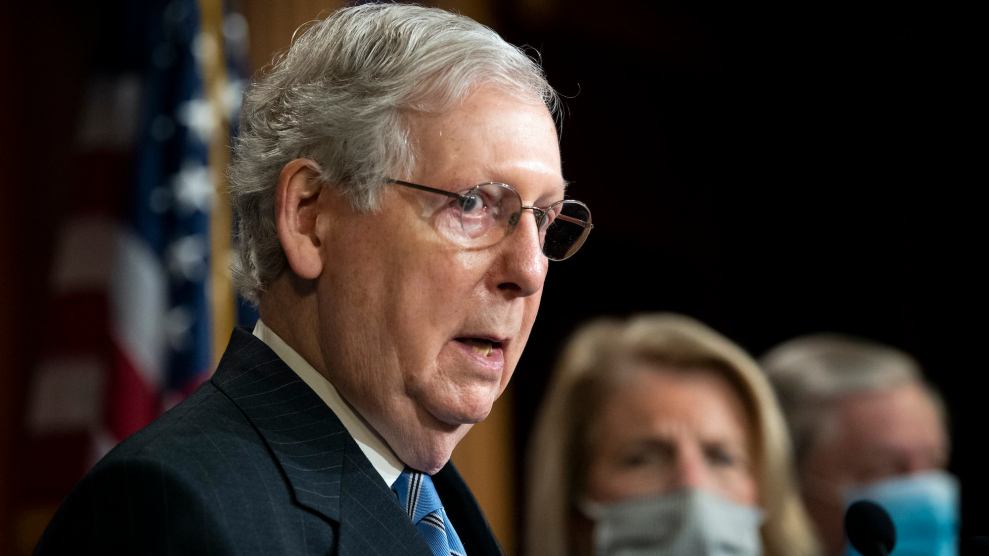
Caroline Brehman/ZUMA
It’s been a primary season full of polling-place disasters, and as Kentuckians vote on Tuesday, there’s reason to believe another one could be on the way. Amid coronavirus concerns, Kentucky has cut the number of polling places from its usual 3700 to just 200, with just one polling place each for the state’s two biggest cities, Louisville and Lexington. The likes of LeBron James have tweeted their dismay about the possibility of long lines and voter suppression.
The most-watched race in the state is the Democratic US Senate primary between Charles Booker and Amy McGrath to decide who will face off against Senate Majority Leader Mitch McConnell (R-Ky.) in November. Primary elections throughout the country this year have been marred by long lines and confusion over mail-in ballots, and Kentucky’s may be no exception. But McConnell has been steadfast in blocking a series of bills passed by the Democratic-led House of Representatives that would make it easier to vote.
Here are the major bills McConnell is refusing to hold votes on:
- In March 2019, the House passed the “For the People Act,” the most significant democracy reform bill in a generation. It would make it easier to vote through policies like nationwide automatic voter registration and two weeks of early voting in every state. McConnell strongly opposed the bill, dubbing it “the Democrat Politician Protection Act,” and called the idea of making Election Day a federal holiday a “power grab” by Democrats, seemingly admitting that Republicans lose when more people vote.
- In December 2019, the House passed a bill to restore and modernize the Voting Rights Act after the Supreme Court ruled in 2013 that states with a long history of voting discrimination no longer needed to approve their election changes with the federal government. It would require states like Georgia and Texas—which have slashed hundreds of polling places in recent years, leading to six-hour lines at the polls—to seek federal approval for such potentially discriminatory election changes. McConnell has taken no action on the bill for 200 days and said in 2016 that he opposed reinstating the preclearance section of the VRA.
- In May of this year, the House passed the “Heroes Act,” a coronavirus relief bill that would give $3.6 billion in election aid to help states run their elections in November. This would allow states to open more polling places, buy new voting equipment to handle a surge of mail-in ballots, and equip election workers with protective gear to shield them from coronavirus. It would also require states to expand vote-by-mail and have at least 15 days of early voting to guard against the spread of COVID-19 and would give the United States Postal Service $25 billion to help with vote-by-mail. McConnell has yet to schedule a vote on it, saying only that the next round of coronavirus relief should be “narrowly crafted.” Republicans have also blocked consideration of the “VoteSafe Act” by Sen. Kamala Harris (D-Calif.), which includes many similar election reforms.
- McConnell has blocked three bills passed by the House aimed at preventing election interference. They would require campaigns to notify the FBI and Federal Election Commission if contacted by foreign actors and require states to use voting machines with paper backups. McConnell has been sharply criticized by election officials in his home state for blocking funding for election security.
McConnell’s opposition to these bills could have an outsize impact in Kentucky, where the Republican-controlled state legislature passed a new voter ID law for November that could make it more difficult to cast a ballot and is expected to disproportionately affect voters of color, who are less likely to possess the required photo IDs. The legislature also has yet to commit to expanding vote-by-mail for the general election. In 2016, Kentucky ranked 44th in MIT’s election performance index, which measures each state’s voter participation and ballot access. McConnell’s refusal to make it easier to vote amid an unprecedented public health crisis and widespread voting problems in the primaries will only increase the likelihood of an election meltdown in November.


















